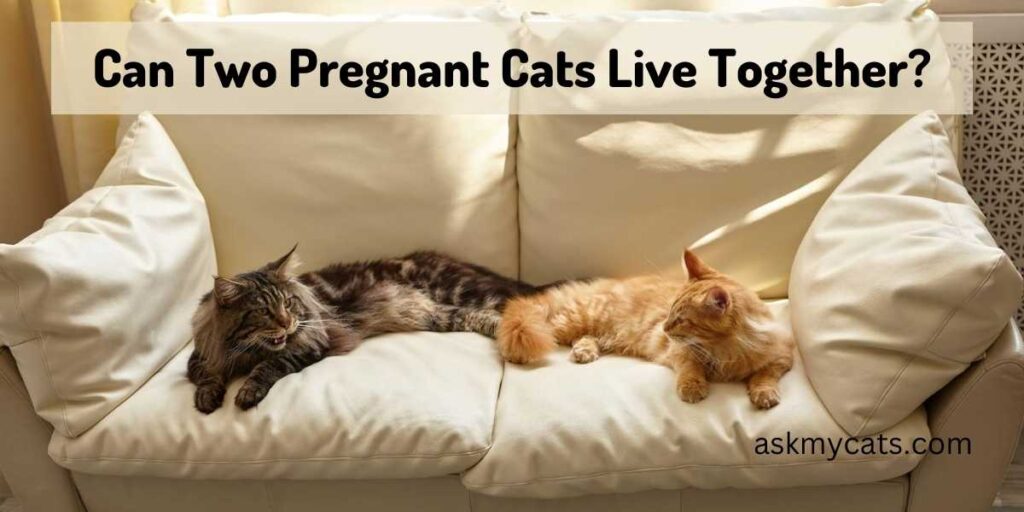Sometimes, owning more than one cat can come with some challenges. If you happen to have two female cats under one roof, they may get along tremendously, and all seems well.
However, if neither cat is spayed, you may find yourself with two cats that become pregnant at the same time.
Pregnant cats suffer from similar morning sicknesses to humans. You’ll also notice your cat’s stomach grow within about four to five weeks. Typical behavior in pregnant cats includes experiencing more exhaustion, snuggling, and even hiding.
Separating the cats from each other or from other animals in the house is something to consider. But can two pregnant cats live together?
The answer is not a simple yes or no; if you’re curious about having pregnant cats living together or around other animals, this article will answer all those questions to help you feel more confident as a cat owner.


Give Your Cat the Perfect Day
Get the Free Ebook!
Should Your Pregnant Cats Be Separated?
If you have more than one cat, and one or two become pregnant, most owners believe you need to separate the pregnant cat from the rest of the group.
However, if your cats all get along and don’t seem to have any problems with each other, there is no real need to separate them.
It is helpful to watch for cues if any of your cats seem anxious or stressed with one another. If you see any issues arise, then it may be time to separate the pregnant cat.
It is a good idea to separate the cats during labor until the litter is born. You may want to continue the separation until the kittens grow, but it is not always necessary.
Will Two Pregnant Cats Get Along?

For the most part, if the cats already got along previously, it shouldn’t change their dynamic much when they are pregnant.
One of the cats may become more dominant and assertive over the other, more likely after the babies are born. But it is common for female cats who are friendly and live with one another to share their litters.
You can let the two moms share a birthing box, as it is expected if the cats already live together and are close that they are naturally oriented to one another.
However, don’t be surprised if one or both cats go to a completely different area when going into labor or after they give birth with their litter.
Sometimes mother cats are more protective of their kittens, so they may want their own space or area away from other animals and people.
If the cats are relatives, you can expect the sharing of litter to be more prominent. Breeders will avoid this type of interaction between pregnant cats because they need to know which cat is the mother.
Again, you should keep a watchful eye on the cats as they interact. Look for signs of one being more protective or aggressive, or if they become anxious or annoyed with one another in case, you need to separate them.
What Signs Do Agitated Cats Demonstrate?

If you’re unsure what to look for to alert that you may need to separate the pregnant cats, it might be better to keep them separated for the time being.
If the cats get along well or are relatives, they are likely to have very few problems. Before, during, and after pregnancy should all go smoothly.
On the other hand, sometimes, cats feel stress or anxiety and act out.
Signs or symptoms that agitated cats show include:
- Swishing their tails
- Crouching or ducking head
- Ears turned back flat; they will look more pointed outward (AKA “airplane ears”)
- Low meowing or high-pitched yowls
- Hissing or swatting with their paws
- Hiding or moving away from the other cat
If you notice any of these signs in your cats, you should separate them. Try to keep them apart until you feel they can be around each other again.
Do Cats’ Behavior Change During Pregnancy?
During pregnancy, a cat’s behavior shouldn’t alter very much. Sometimes you may notice a cat become more loving and cuddly, and few ever become more aggressive.
Hormones are the most significant factor that changes during pregnancy, and, like humans, the same goes for cats. Your cat feels more tired and may sleep frequently or become more attention-seeking and want you around more.
Interesting Read: Do Pregnant Cats Sleep A Lot?
When your cat goes into labor, you will see more noticeable changes in behavior. Your cat usually will do more licking, pacing, and howling when in labor.
When you see this behavior, you want to ensure you have a birthing area or space ready for the cat. Do it quickly because soon, their water will break, and birth will begin.
Aggression After Labor
You will most likely see more signs of aggression and protection from the cats immediately after the kittens are born.
The mother cats may start growling, hissing, swatting, or chasing each other. They could even try to bite the other cat if it gets too close, and this can occur even if they usually get along.
Maternal aggression is entirely normal and usually will go away after kittens are weaned from nursing. It could benefit both mother cats if you separate them during labor and after they give birth until the kittens are a little more grown.
Caring for Pregnant Cats
One of the other things you should be mindful of with two pregnant cats is nutrition. If you have other animals in the house, keeping the pregnant cats in their own area may be better.
Both cats will need a well-balanced diet with additional calories as they progress within their pregnancy. If you have any questions, you should discuss care with your veterinarian.
Water is a critical part of keeping your cat hydrated during pregnancy. So, it is helpful to keep more than one water bowl in areas around the home so that your cats have easy access.
Be sure as you near closer to the due date to check your cat’s comfort level and that they are still eating food. If you notice your cats losing interest in eating, that is a sign there could be a problem within the pregnancy.
Most cats will be able to deliver their litter without needing any assistance, but you should keep a close eye on any problems that arise.
Seek out the attention of your vet if you see your cat struggling with delivery, the mother becomes lethargic, vomiting, diarrhea, or you see extensive blood after delivery.
It can be stressful during labor, and you must have the cat examined after delivery by a veterinarian to ensure there are no complications.
Your cats will likely spend most of the time with their new kittens to help regulate body temperature, feed them, and clean them. Pay attention that the cat moms are still eating or acting abnormally after giving birth.
Other Things To Watch Out For in Pregnant Cats
There are some common cat allergies to watch out for as well. Environmental allergies can occur if you’ve moved your cat to a new location.
Ensure there are no adverse elements within your home or outdoors that your cat could be allergic to, such as fleas or excessive dust.
Also, if you switch out their food during pregnancy, it is possible that your can could have a food allergy.
If you notice your pregnant cat doing a lot of scratching, licking, chewing, or see red or dry patches of skin, your cat may very well be having an allergic reaction and need treatment.
You mustn’t allow your cats to have too much rowdy activity with each other during the pregnancies. Lots of jumping and playing can be too much for a pregnant cat.
You need to work to keep the cats calm when nearing their due dates; too much movement can cause stress.
DO NOT separate kittens from their mothers too early. It is a common misconception among owners that you can separate kittens from their moms at eight weeks of age.
But this can pose risks for social, health, and developmental issues. Kittens should remain with their mothers until they are at least 12 to 14 weeks old.
Frequently Asked Questions
Is it safe for pregnant cats to live together?
Is it common for mom cats to share litters and help each other, especially if they already have been living and playing together. As long as you don’t notice any changes in behavior toward one another, the cats can live together peacefully during and after pregnancy.
Will two pregnant cats get along?
You may notice that one mother dominates over both litters after the cats give birth, which is a natural behavior. However, if you notice any adverse behavior such as overprotectiveness, growling, hissing, or fighting, it indicates the cats aren’t getting along and need to be separated.
Can pregnant cats be around other cats?
It is wise not to buy or bring a new cat around when you have pregnant cats. Stray cats should also be avoided, particularly kittens. Otherwise, if the cats have already been living together and get along, they can be around one another while pregnant.
Final Thoughts
It’s not an easy answer if two cats can live together during their pregnancy and birth. As a matter of fact, depending on the cats’ previous history as pals or living mates, they may not be suitable to be together during their pregnancy.
Most likely, if they have gotten along before or are relatives, living alongside each other won’t be an issue.
However, there is always the labor and whether you want both cats to share litters. Most cats like to be left alone while they are giving birth, so chances are each cat will find their own space or area away from one another.
It might be beneficial to the relationship to keep them separate until the kittens have done some growing before allowing them to be with each other again.
In truth, the choice is ultimately yours, and how comfortable the cats interact and play with each other. Be alert to any behavioral changes, care for your cats’ nutrition, and reach out to a veterinarian with any questions or concerns.
Interesting Read: Can A Cat Nurse Kittens That Aren’t Hers?
